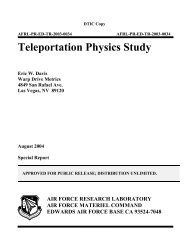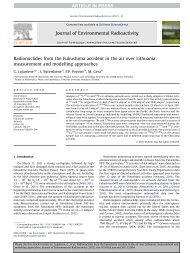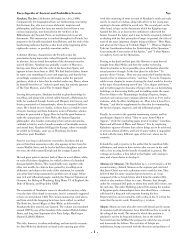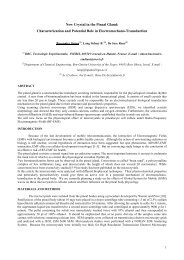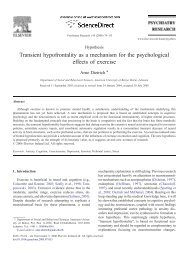Psychology of Terrorism - National Criminal Justice Reference Service
Psychology of Terrorism - National Criminal Justice Reference Service
Psychology of Terrorism - National Criminal Justice Reference Service
You also want an ePaper? Increase the reach of your titles
YUMPU automatically turns print PDFs into web optimized ePapers that Google loves.
11. Bandura, A. (2003). The origins and consequences <strong>of</strong> moral disengagement: A social learning perspective. F.M. Moghaddam, & A. J. Marsella (Eds), Understanding <strong>Terrorism</strong>: Psychosocial Roots,consequences, and interventions . Washington, DC: American Psychological Association.Call Number: Key Quote Summary: This essay explores the intellectual artifacts and mechanismsthat enable terrorists to do what they do- to kill indiscriminately in the name <strong>of</strong> political, social orcultural causes.-While it is widely recognized that there are no neat explanations <strong>of</strong> terrorism, that has not deterredresearch that seeks to discover underlying causes in the make-up <strong>of</strong> the terrorist personality.-Without presuming too much, it is fair to say that a psychologist begins with an individual whosecharacteristic way <strong>of</strong> behaving is formed out <strong>of</strong> a complex interaction between emotional andneurological materials and social experiences.-In his comprehensive review <strong>of</strong> terrorism (Laqueur 1987), notes that the analyses <strong>of</strong> motivations areas numerous and diverse as are the definitions and myriad forms <strong>of</strong> the phenomenon.-Freedman observes that: “A psychological pr<strong>of</strong>ile <strong>of</strong> a model terrorist cannot be drawn. Thepersonalities are disparate.”-We now turn to techniques <strong>of</strong> emotional concealment that enable the violent to rid themselves <strong>of</strong> theterrorist taint.-To engage openly in indiscriminate violence, the individual must “morally disengage.”-In this regard, Bandura’s model <strong>of</strong> the socio-psychological process is instructive.-The “conversion process” <strong>of</strong> the socialized into dedicated revolutionaries is not only achieved byaltering their personality structures, aggressive drives or even moral standards. By cognitivelyrestructuring the moral value <strong>of</strong> crimes committed against specific groups so that they can be donefree from censuring doubt, the tasks <strong>of</strong> making violence morally defensible is facilitated.-Responsibility can also be diffused such that an emotional division <strong>of</strong> labor can occur. Terroristorganizations are created and this means that there is a fractional compartmentalization <strong>of</strong> tasks.Moreover, decision-making in a hierarchy <strong>of</strong> authority may easily induce otherwise sensitiveindividuals to behave inhumanely because no single person need feel responsible for policies arrivedat collectively or imposed by distant, unknown others in the organization’s leadership cadres.-Immersion in the group’s ideology, specifically in its dehumanization <strong>of</strong> the enemy, can deadenmoral sensibilities.-The mesmerizing power <strong>of</strong> an ideology is not limited to politically desperate and naďve individualsready to cling to any set <strong>of</strong> ideas that promise relief from despair.-Unlike more group-restricted or privatized paradigms, ideologies are a rhetoric <strong>of</strong> public discourseand produce what may be called “dramaturgic accentuation”.-Ideologically inspired political programs drive contemporary movements that are labeled“terrorist”. Ideologies would appear to be basic foundational elements in cultivating themotivational structure and “mind-set” <strong>of</strong> the believer/adherent.-The importance <strong>of</strong> a socially inspired belief system resides in its power to communicate, ideals,evaluations, and goals among group members. A major feature <strong>of</strong> ideological thought is thehistorical consciousness it breeds among those who embrace it.-Ideologies are thus concerned with things to come. As a method <strong>of</strong> interpretation ideologies mustpossess some logic.-As programs <strong>of</strong> actions, terrorist insurgencies are rarely isolated phenomena: they tend to reflectdiffuse sympathies, desires and aspirations <strong>of</strong> larger segments <strong>of</strong> society.-Ideology plays a role in sculpting the social universe: it aids by providing names, predicates,gestures, pictures, and interpretations <strong>of</strong> events. The “recipe knowledge” <strong>of</strong> ideology rewriteshistory in the interest <strong>of</strong> a political agenda, and enables the terrorist to re-structure social reality inways that lend themselves to revolutionary interventions.-To the extent that the organization and its social and political theories become the grounding <strong>of</strong>identity, the task <strong>of</strong> the terrorist then is not simply an empirical one <strong>of</strong> proselytizing; more isinvolved. First there is the job <strong>of</strong> spreading the word; secondly, one must do what is needed, which<strong>of</strong>ten entails defending the group against those who seek to discredit it.-Whether the strategies <strong>of</strong> disobedience involve only symbolic protest or lead social movements,they seek to persuade the political leadership that it must attend to the opposition’s proposals so thatmodifications and changes satisfactory to all parties can be achieved.-If a group believes it is treated unjustly, if the political process is unresponsive and <strong>of</strong>fers little



